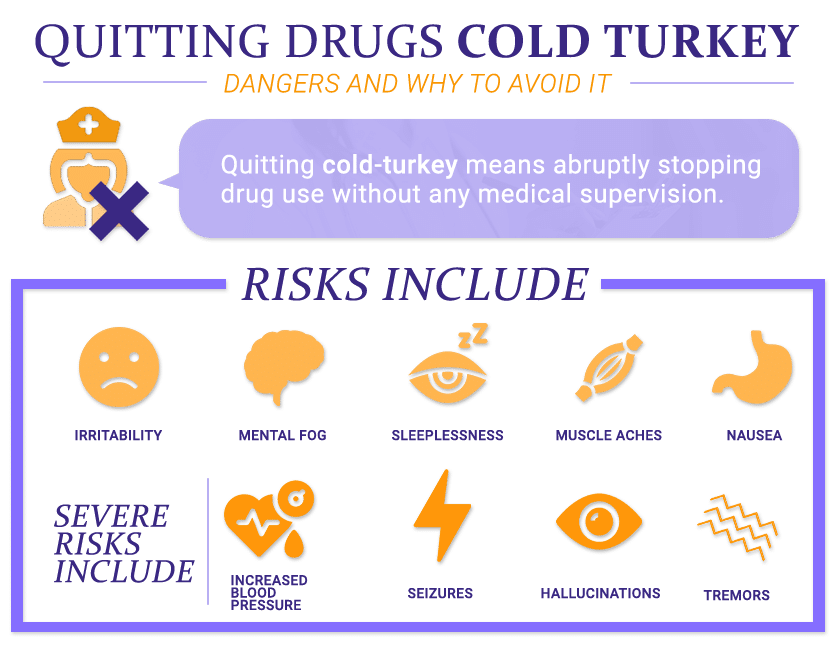There comes a point in addiction when many people decide that they want to get clean. It may seem like the logical first step is quitting drugs cold turkey, but this is a risky move. Quitting drugs or alcohol abruptly isn’t the best way to start your recovery journey. The dangers that come with stopping drug use require a careful, and often medically involved, process to safely stop using drugs. If you’re considering quitting drugs cold turkey, it’s best to have all the facts about the risks and dangers involved.
What Does it Mean to Quit Drugs Cold Turkey?
 Quitting drugs cold turkey is when someone abruptly stops taking the drug they have been abusing. Most people who quit cold turkey do so at home, without the guidance of a medical professional. As a result, the chances of relapse when quitting drugs cold turkey is high. Without medical assistance and therapeutic intervention, it is difficult for most people to maintain sobriety.
Quitting drugs cold turkey is when someone abruptly stops taking the drug they have been abusing. Most people who quit cold turkey do so at home, without the guidance of a medical professional. As a result, the chances of relapse when quitting drugs cold turkey is high. Without medical assistance and therapeutic intervention, it is difficult for most people to maintain sobriety.
Drug addiction, as a chronic disease, is difficult to overcome on one’s own. The intense cravings make turning away from drug use difficult. Additionally, not due to any lack of will, but because of how intense withdrawal symptoms can be, many people return to their substance of choice to alleviate the side-effects of quitting drugs cold turkey.
Why Do People Try to Quit Cold Turkey?
Quitting drugs cold turkey is appealing to many addicts as it provides a way to stop drug use in the comfort of their own homes. Moreover, participating in a treatment program can seem intimidating while quitting at home supplies an environment seemingly free of judgment.
Making the decision to quit using drugs or abusing alcohol is a great first step in the recovery process. It’s difficult for many addicts to even acknowledge that they are suffering from addiction. However, the resolve it takes to decide to quit isn’t enough to overcome the effects of suddenly discontinuing substance abuse.
The Dangers of Quitting Drugs Cold Turkey
When drugs are abused, the human body develops a physical and mental dependence on them. To maintain equilibrium, the brain and body both rely on the drug for stability. Suddenly removing the drugs that your body has grown accustomed to upsets this equilibrium.
A few of the milder symptoms of withdrawal that you may experience when quitting drugs cold turkey include:
- Irritability
- Agitation
- Mental fog
- Mood swings
- Restlessness
- Muscle aches
- Sleeplessness
- Pain sensitivity
- Loss of appetite
- Stomach cramping
- Nausea and vomiting
- Depression and anxiety
Is Quitting Drugs Cold Turkey Lethal?
The nervous system’s adaptation to high dependency drugs is particularly dangerous to navigate on one’s own. Side effects that are life-threatening and serious in nature could occur, including:
- Coma
- Tremors
- Seizures
- Delusions
- Tachycardia
- Hyperthermia
- Hallucinations
- Increased blood pressure
- Increased or irregular heart rate
While quitting drugs cold turkey may seem like the right thing to do, the risks involved make it highly dangerous. In some cases, the more dangerous symptoms can lead to life-long chronic conditions or, in the worst case, death.

Factors to Consider When Quitting Drugs
If you’re considering quitting drugs cold turkey, it’s important to consider the many different factors involved that will directly affect the withdrawal process. These factors include:
- The type of drug you’re using. What you’re addicted to will determine what withdrawal symptoms you experience. For example, when quitting alcohol, there is a risk of experiencing a potentially fatal condition called delirium tremens.
- How long you’ve been taking a drug. Your mind and body’s dependence on a drug gets worse over time. Addicts who have been in a state of active addiction for a long time have more intense symptoms of withdrawal.
- How much you take/your tolerance. The more of a drug you take, the more severe your addiction is considered. This means that withdrawal symptoms will be worse for people who take more of the same drug.
- Co-occurring conditions. Certain medical conditions or co-occurring mental health issues may complicate the withdrawal process. The unpredictability of how conditions may affect withdrawal makes it difficult to determine exactly what symptoms will be present.
There is a way to avoid the risk associated with quitting drugs. With a medically assisted treatment plan, a safer, more effective way to stop abusing substances exists.
What are Medically-Assisted Treatment Plans?
Much safer than quitting drugs cold turkey, Medically-Assisted Treatment (MAT) plans are programs that give those suffering from drug and alcohol addiction a safe way to stop taking substances without experiencing the dangerous symptoms of withdrawal. Medical professionals prescribe medications that aid with the detoxification process and help wean patients off their drug of choice incrementally.
Through a MAT plan, patients are provided with therapy and medical intervention to help manage the effects of withdrawal in a safe way. This is especially important for patients detoxing from alcohol, opiates, or barbiturates as these substances produce powerful withdrawal symptoms. Some of the benefits of this type of treatment include:
- Reversing drug cravings
- Suppressing withdrawal symptoms
- Facilitating the process of detoxification
- Treating symptoms of co-occurring disorders
What Medications are Used in MAT Programs?
Different medications are used in an MAT program depending on the needs of the person suffering from a substance abuse disorder. For example, when ceasing heavy alcohol use, the onset of severe Alcohol Withdrawal Syndrome (AWS) is treated with benzodiazepines to manage dangerous and excessive neuronal activity. These include:
- Serax
- Ativan
- Diazepam
- Chlordiazepoxide
Additionally, other common prescription drugs MAT involves might include:
- Acamprosate: Used to stabilize the chemical imbalances in the brain that alcohol abuse causes, Acamprosate helps people avoid drinking once they have quit. This is usually prescribed after initial sobriety has been achieved to prevent an alcoholic from drinking again.
- Disulfiram: Disulfiram changes the way the body eliminates alcohol to prevent relapse. Therefore, rather than enjoying alcohol, the medication makes the person drinking feel sick to remove the appeal of drinking.
- Naltrexone: This medication is used to prevent relapse by eliminating the euphoric effects of drugs like opiates or alcohol. Patients typically have a prescription for this medication for around 4 to 6 months via an injection or pill.
- Buprenorphine: Use to limit the physical dependence people have on opioids, Buprenorphine produces a euphoric effect to reduce and suppress cravings.
- Methadone: Similar to Buprenorphine, Methadone works to prevent relapse by reducing opioid cravings and blocking the effects of the drug.
Detoxing Safely with New Directions for Women
With the availability of treatment that safely facilitates detox and therapy, quitting drugs cold turkey isn’t the only option for overcoming addiction. Treatment may seem intimidating but offers a judgment-free environment to safely detox in. If you or someone you love is ready to stop the cycle of addiction, we at New Directions for Women are ready to help. To decide if medication-assisted treatment is right for you or your family member, contact us today.
References:












